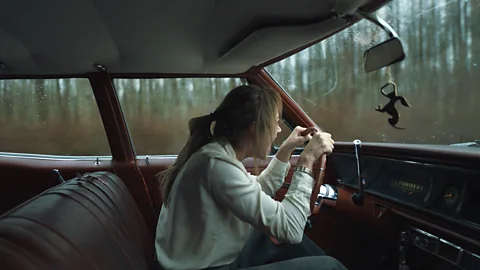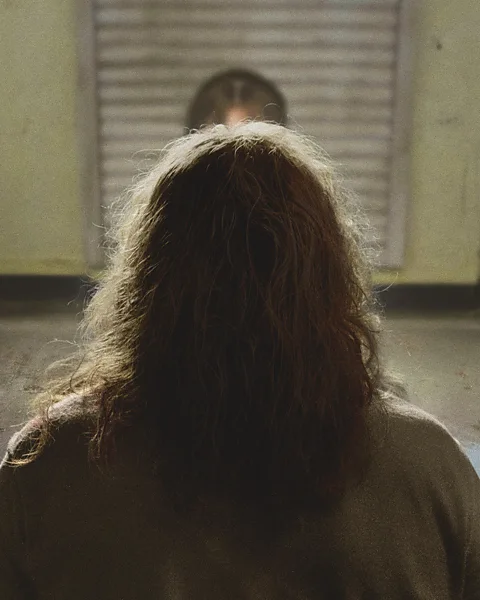A grim horror is this summer’s ‘anti-blockbuster’

4 hours ago
By Nicholas Barber,
 Neon
NeonStarring Nicolas Cage as a satanist mass murderer, Longlegs has been called “the scariest film of the decade”. Here’s why, despite its snowy setting, it’s perfect summer programming.
I’m relieved to report that I didn’t have nightmares after I watched Longlegs, but I could see why it might be this year’s most talked-about “elevated horror” film, ie a horror film that doesn’t rely on jump scares, but on a pervasive air of dread and disorientation. Its cast and crew are a key factor. The film’s writer-director is a horror-fan favourite, and he also happens to be the son of the star of Psycho, Anthony Perkins. Its star, Maika Monroe, has been associated with high-quality spookiness ever since she appeared in two 2014 films, It Follows and The Guest. And her co-star, Nicolas Cage, is never happier than when he is being the weirdest actor in US cinema.
Monroe stars as Lee Harker, an earnest, anti-social FBI agent whose career is getting underway in the 1990s – yes, Jodie Foster’s Clarice Starling in Silence Of The Lambs is clearly an influence. Her hunches are so reliable that she may have psychic powers – and in the uncanny netherworld of Longlegs, psychic powers are not unheard-of – so she is seconded to investigate a satanist (Cage) who has slaughtered 10 families over a 30-year period. Cryptic notes were found at the scene of every crime, but it always seemed as if the father / husband of each family had murdered his wife and children, and then killed himself. The only rational explanation is that the satanist somehow persuaded other men to do his killing for him. Or, as Harper’s boss (Blair Underwood) puts it, “He murders them, but not in person.”
If that weren’t sinister enough, all of the lightbulbs in the film seem to have the lowest possible wattage, and its colour palette is dominated by shades of brown – yes, Seven is another big influence. And Cage, preening and cackling while caked in white make-up, shows us what he would have done if he’d been cast as the Joker in The Dark Knight. Longlegs is also so snowy and wintry that it can’t be long before fans are arguing on social media over whether it counts as a Christmas film.
The art of counterprogramming
All of this raises the question of why it is being released in the middle of summer. Why is a skin-crawling serial-killer thriller being asked to compete with the crowd-pleasing, megabudget likes of Twisters and Deadpool & Wolverine? The answer is that it’s a cunning example of counterprogramming – that is, the practice of releasing a film around the same time as another, higher-profile film of a starkly different genre. The idea is that lots of people will go to the cinema over the holidays, but at least some of those people will fancy an alternative to whichever blockbuster is hogging most of the screens in their local multiplex.
What has often happened traditionally is that a deafeningly noisy action epic has been touted as the biggest film of the summer, so distributors have sneaked out a smaller-scale romantic comedy for anyone craving some light relief. When Star Wars – Episode I: The Phantom Menace came out in May 1999, many cinemagoers were happy to pop to Notting Hill instead. When The Dark Knight shrouded Batman in doom and gloom in July 2008, the sunny escapism of Mamma Mia! made a refreshing change. Armageddon and Saving Private Ryan were both released in July 1998, so it’s no wonder that audiences wanted to steady their nerves with There’s Something About Mary.
 Neon
NeonThis sort of counterprogramming faded over the past decade, as Hollywood largely gave up on rom-coms, but last year it came back with a bang. A few months after Universal announced that Oppenheimer would be released on 21 July, Warner Bros announced that they were releasing Barbie on the same day. It almost felt like a parody of counterprogramming: a furrow-browed Christopher Nolan drama about the atomic bomb versus a bright pink Greta Gerwig comedy about a fashion doll. But the absurd contrast between the two films turned out to be so irresistible that millions of us opted to see them both. 2023 became the year of Barbenheimer.
More like this:
This summer, counterprogramming has been transformed again. Hollywood romantic comedies such as A Family Affair and The Idea of You have been consigned to streaming services, and there are relatively few major blockbusters on the schedule – just one Marvel film, nothing from DC, no new instalment of Star Wars, Jurassic Park or Mission: Impossible. That has left the way clear for a different variety of low-budget alternatives. Rather than light and feelgood films, we’re getting dark and feelbad films, each one scarier and grislier than the last. We’ve already had Kill (bone-snapping violence aboard an Indian train) and MaXXXine (bloody mayhem in 1980s Los Angeles), and before the summer is out, we can see Trap (serial killer at a pop concert), Blink Twice (women trapped on a private island), Speak No Evil (murderous couple preying on holiday-makers) – and, of course, Longlegs.
In effect, these films are anti-blockbusters. They aren’t bursting with explosions and CGI, and they don’t have sweeping orchestral scores and expensive ad campaigns, but they do offer the type of popcorn-dropping excitement that is best experienced in a cinema surrounded by other people. If they’re successful enough, horror movies could become the new summer blockbusters, while superhero movies become the counterprogramming alternatives.
Longlegs is released in US and UK cinemas on 12 July.









